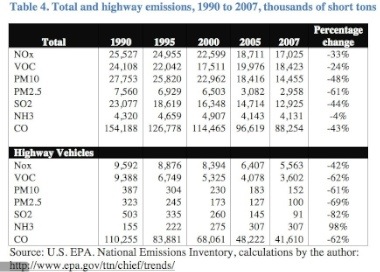Michael Lewyn is a blogger for Planetizen, and in fairness, blogging is not always an easy gig. It’s hard to come up with stuff to say. Nonetheless, this entry (Waiting for a miracle | Planetizen) has me just hitting my head up against a wall. I understand that people like Wendell Cox and Randy O’Toole are frustrating for planners, but we were having this “New Urbanism vs. technology” discussion when I was a master’s student in 1995. That’s over a decade and a half ago (yes, I’m old, shut up). Are we still discussing that topic? Really? Lewyn portrays the technology side as magical thinking because technology hasn’t saved us so far.*
Let’s break this down. First of all, it’s a tired and false dichotomy regardless of which side (the technology or the transit side) makes the argument.
Second of all, what? Ok, I get it. People see the technology argument as the urban equivalent of people who think they’ll be able to take a pill to prevent heart disease in a few years. Sure. I also get the more ideological point: people who hate cars want them to go away, and altering vehicle technologies is no way to make cars go away.
But ok…how do you really get off thinking that a lot of our transit hopes and dreams aren’t magical thinking? How can we explain the faith that “transit will save us” when we have poured money into it since the 1970s, and it hasn’t really saved us thus far, either, no matter how many nice places have transit and no matter how many nice things transit does. Transit has done very good things, and I’m a big fan of it, but it doesn’t seem to be saving us very fast either, not if you are hard-nosed about what “saving” means.
The usual answer to my question from those who are vehement: “Oh, all we need to do is pour more billions into transit! Those car people gots lots more billions than us, so it’s only fair for us to get some more billions. So when we get those billions, then transit will save us. So we have to convince Congress to give us billions. And we’ll need more billions for HSR because HSR will save us, too. Then we just need to build all that new infrastructure which will get done before we all know it. Oh, and we’ll need to pour some billions into walking and biking infrastructure–we should have federal funding for those, too and so we’ll get those billions, too—and oh, while we’re at it, we’ll get affluent Americans to change their home-buying behavior and their residential location decisions; we’ll get employers to change their employment locations, completely remake manufacturing so that we won’t have large-scale facilities breaking up urban walking environments (or maybe we can just chase all that icky manufacturing to poor countries internationally; doesn’t effect me, I don’t work there), and entirely re-form metropolitan regions to be like Paris, London, and New York, and Tokyo including the parts of Paris, London, and New York that don’t look like their downtowns or Tokyo, by changing municipal building codes and zoning codes and tax codes and, then we just need to convince a whole bunch of recalcitrant neighbors that density is *great* and more kids in their children’s classrooms is a swell idea, as is paying for parking that is now free; oh, and we can just quadruple the gas tax even though right now we can’t get a one-cent increase in it; but gasoline will be $20 a gallon due to peak oil practically tomorrow so that relieves us of worrying about petrol taxes, and we’ll resolve all those land assembly and/or brownfield problems you get with infill, and then after that we’ll be all set to go! Man, those people who think changing engine technologies is a practical way forward–c’mon! like *that’s* ever happened (the catalytic converter, sensors)–those people just lack common sense.”
I’m being sarcastic, but nothing annoys me more than people who minimize or obfuscate the very significant challenges–social, economic, political and physical–in implementation surrounding a sustainable city vision on all fronts. These problems with implementation plague all strategies–transit, land use, and technology—and planners diminish the significant skill and complexity of their professional work when they act like planning reform is all just so easy and anybody not on board is just dumb or a craven advocate of the status quo.
The Moving Cooler report strikes me having the right take, even if you can dispute their assumptions/methods: we’ll need reductions from pricing and taxation AND technology AND transit/land use in order for us to make a dent in climate change, and that the timing matters here tremendously: pricing and taxes for near-term reductions, technology for mid-term reductions, and transit/land use for long-term reductions.
I also like technology use WITH transit. I don’t think we’re going to get a lot choice riders on transit quickly without real-time routing and arrival systems, new, comfort-enhancing on-vehicle technologies, and a bunch of other distributed applications for technology like Routesy. (Has Routesy come back? I hope so.) Changing vehicle, engine, and fuel technologies on the rail side would do a lot to help out freight rail’s residential neighbors. How anybody thinks we are going to green freight without technology is way beyond me.
And portraying people who buy three cars for a family as being “impoverished” annoys me a lot. Yes, being forced to own a car to participate in social and economic life is a burden. But..it’s not the same as really belonging to a group that faces violent and systematic impoverishment.
 *Technology has helped us out quite a bit. Take a look at this table.
*Technology has helped us out quite a bit. Take a look at this table.